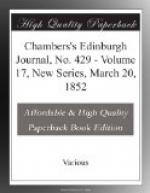Next we come to a complete chapter, entitled the ’Ten Advantages of Chess,’ in which the views and reasonings are eminently Oriental and characteristic. The first explains that food and exercise are good for the mind as well as for the body, and that chess is a most excellent means for quickening the intellect, and enabling it to gain knowledge. ’For the glory of man is knowledge, and chess is the nourishment of the mind, the solace of the spirit, the polisher of intelligence, the bright sun of understanding, and has been preferred by the philosopher, its inventor, to all other means by which we arrive at wisdom.’ The second advantage is in the promotion and cultivation of religion; predestination and free-will are both exemplified—the player being able to move where he will, yet always in obedience to certain laws. ‘Whereas,’ says the writer, ’Nerd—that is, Eastern backgammon—on the contrary, is mere free-will, while in dice, again, all is compulsion.’ The third and fourth advantages relate to government and war; and the fifth to astronomy, illustrating its several phenomena as shewn by the text, according to which ’the board represents the heavens, in which the squares are the celestial houses, and the pieces, stars. The superior pieces are likened to the moving stars; and the pawns, which have only one movement, to the fixed stars. The king is as the sun, and the wazir in place of the moon, and the elephants and taliah in the place of Saturn, and the rukhs and dabbabah in that of Mars, and the horses and camel in that of Jupiter, and the ferzin and zarafah in that of Venus; and all these pieces have their accidents, corresponding with the trines and quadrates, and conjunction and opposition, and ascendancy and decline—such as the heavenly bodies have; and the eclipse of the sun is figured by shah caim or stale mate;’ and much more to the same purport. We question whether the astronomer-royal ever suspected he was illustrating his own science when engaged in one of his quiet games of chess with the master of trinity.
The sixth advantage is somewhat astrological in character: as there are four principal movements of chess, these answer to the four physical temperaments, Cold, Warm, Dry, and Wet, which are ruled by their respective planets; and thus each piece on the board is made to have its peculiar significance in relation with the stars. It is further shewn, that chess-playing is remedial against many of the lesser bodily ailments; ’and no illness is more grievous than hunger and thirst, yet both of these, when the mind is engaged in chess, are no longer thought of.’ Next in order, the seventh advantage, is ’in obtaining repose for the soul;’ as the author observes: ’The soul hath illnesses like as the body hath, and the cure of these last is known; but of the soul’s illness there be also many kinds, and of these I will mention a few.’ These are ignorance, disobedience, haste, cunning, avarice, tyranny, lying, pride, deceit,




